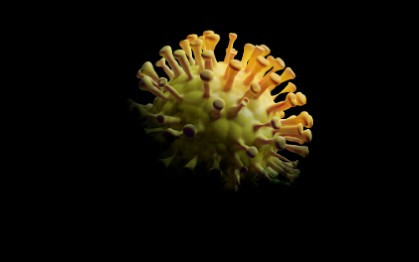About new variants of COVID-19
New variants of COVID-19
RNA viruses can infect and replicate in its host cells. During the copying process, small errors may occur occasionally and virus mutation may arise as a result. Mutations are mixed blessing for a virus because not all mutations have a significant impact on its characteristics. Some virus strains (variants) contain mutations that help the virus copy itself or get into human cells easily. SARS-CoV-2 has been evolving and certain mutant variants are concerning due to its potential effect on current drugs and vaccine, diagnostic tools and public health measures.
iWhat is the SARS-CoV-2 variant of concern?
| WHO labels | Pango lineages | Earliest documented samples |
| Alpha | B.1.1.7 | United Kingdom, September 2020 |
| Beta | B.1.351 | South Africa, May 2020 |
| Gamma | P.1 | Brazil, November 2020 |
| Delta | B.1.617.2 | India, October 2020 |
| Omicron* | B.1.1.529 | Multiple countries, November 2021 |
Variant of concern are those with evidence of increase transmissibility, increase hospitalizations or deaths, reduced effectiveness of treatment or vaccine or diagnostic detection failures.
*On 26 November 2021, WHO has designated B.1.1.529 as a VOC, named Omicron.
What is the SARS-CoV-2 variant of interest?
| WHO labels | Pango lineages | Earliest documented samples |
| Lambda | C.37 | Peru, August 2020 |
| Mu | B.1.621 | Colombia, January 2021 |
Variant of interest are those with specific genetic markers that have been associated with changes to receptor binding, reduced neutralization by antibodies generated against vaccine or previous infection, reduced effectiveness of treatments, potential impact on diagnostic tool, or predicted increase in transmissibility of disease severity.
What are the SARS-Cov-2 variants under monitoring(variants under monitoring)?
| Pango lineages | Earliest documented samples | Data of designation |
| AZ.5 | Multiple countries, January 2021 | June 2021 |
| C.1.2 | South Africa, May 2021 | September 2021 |
| B.1.617.1 | India, October 2021 | September 2021 |
| B.1.526 | U.S., November 2020 | September 2021 |
| B.1.525 | Multiple countries, December 2020 | September 2021 |
| B.1.630 | Dominican Republic, March 2021 | October 2021 |
| B.1.640 | Republic of Congo, September 2021 | November 2021 |
Some SARS-CoV-2 variants carry genetic changes that are suspected to affect virus characteristics with some indication that it may pose a future risk, but evidence of phenotypic or epidemiological impact is currently unclear. They require enhanced monitoring and repeat assessment pending new evidence.
Delta Impact
Coronavirus’ spike proteins (S protein) engage with human cell receptor, thereby enable an infection. Hence, S protein often serve as the molecular target for developing diagnostic tool and a vaccine candidate. If a variant contains mutations that change the protein structure, it may increase COVID-19 pandemic severity. ii Nature revealed that the Delta variant is around 60% more transmissible than the already highly infectious Alpha variant. A UK study found that a single dose BioNTech's vaccine reduced a person’s risk of developing COVID-19 symptoms caused by the Delta variant by 33%, compared to 50% for the Alpha variant. A second dose of BioNTech were 88% effective (compared to 93% against Alpha). Another study found that people who have had one vaccine dose are 75% less likely to be hospitalized, compared with unvaccinated individuals, and those who are fully protected are 94% less likely to be hospitalized.
According to the Department of Health (Hong Kong), both Comirnaty(BioNTech) and Sinovac COVID-19 vaccines are highly effective in protecting against severe diseases and death from COVID-19 infection, which is generally related to T-cell response. The antibody response is related to prevention of infection and symptomatic disease. It is also more susceptible to Variants of Concern. Therefore, it may differ among different vaccines.
Reference:
i. https://www.who.int/activities/tracking-SARS-CoV-2-variants/tracking-SARS-CoV-2-variants






